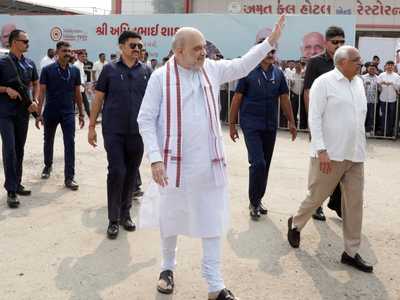New Delhi [India], October 26 (ANI): Union Home Minister and Minister of Cooperation Amit Shah will distribute the state-of-the-art Deep-Sea Fishing Vessels at Mazagon Dock, Mumbai on October 27. Devendra Fadnavis, Chief Minister of Maharashtra; Eknath Shinde and Ajit Pawar, Deputy Chief Ministers of Maharashtra and Murlidhar Mohol, Union Minister of State (Cooperation), will be present on the occasion.
According to a release from the Ministry of Cooperation, the handing over of the keys of deep-sea fishing vessels to beneficiaries by Union Cooperation Minister Amit Shah will mark a historic milestone in cooperative-led deep-sea fishing, which will symbolise India's commitment to self-reliance, sustainability and empowering cooperatives in the fisheries sector.
Deep Sea Fishing Vessels are being given to the beneficiaries under Pradhan Mantri Matsya Sampada Yojna with a unit cost of Rs 1.2 Cr with financial support from the Government of Maharashtra, the National Cooperative Development Corporation (NCDC) and the Department of Fisheries, Government of India. This initiative is a testament to the Modi Government's commitment to realising the vision of Aatmanirbhar Bharat and strengthening the Blue Economy.
Under the leadership of Prime Minister Narendra Modi, it marks a significant step towards modernising India's Marine fisheries sector, enhancing deep-sea fishing capacity, and promoting cooperative-led growth in coastal regions. It aims to explore fisheries resources in the Indian EEZ and High Seas.
In view to accelerate cooperative-led deep-sea fishing initiatives through cooperatives and FFPOs a Joint Working Group (JWG) has been constituted by the Department of Fisheries, Ministry of Fisheries, Animal Husbandry and Dairying, Government of India and Department of Cooperatives, Ministry of Cooperation, Government of India.
India's marine fisheries sector has traditionally operated on a modest scale, with fishermen relying on conventional vessels and techniques, typically venturing only up to 40-60 nautical miles from the coastline. This limited operational range has constrained catch volumes and economic returns.
This initiative will empower fisheries cooperative societies and FFPOs to sustainably harness the vast potential of India's Exclusive Economic Zone (EEZ) and High Seas, particularly in regions like Lakshadweep and Andaman & Nicobar Islands. It is expected to unlock new opportunities in high-value fisheries such as tuna, thereby enhancing India's seafood exports and strengthening coastal livelihoods.
The inauguration of deep-sea fishing vessels at Mazagon Dock represents a pivotal moment in the modernisation of India's marine fisheries infrastructure. These newly constructed vessels are equipped with advanced technologies that enable sustainable harvesting of aquatic resources, ensuring minimal ecological disruption while maximising economic returns. The integration of onboard digital systems will enhance traceability, safety, and operational efficiency, aligning India's marine practices with global standards of responsible fishing.
A central focus of the event is the strengthening of fisheries cooperatives, which play a vital role in empowering coastal communities. The initiative supports the development and scaling of Fish Farmer Producer Organisations (FFPOs) and cooperative societies, enabling them to function as self-reliant entities. Importantly, the initiative places strong emphasis on promoting women-led cooperative enterprises, recognising their critical role in driving inclusive growth, leadership, and socio-economic transformation in coastal communities.
The event also highlights the convergence of government schemes and institutional support mechanisms aimed at transforming the fisheries landscape. The schemes like Pradhan Mantri Matsya Sampada Yojana (PMMSY) and the Fisheries and Aquaculture Infrastructure Development Fund (FIDF) are instrumental in developing cold-chain and value-chain infrastructure for marine produce, enhancing the quality, shelf-life, and marketability of fishery products. Additionally, efforts are being made to improve market access, ensuring better price realisation and economic sustainability.
Finally, the strategic role of fisheries cooperatives in advancing India's Blue Economy and securing coastal livelihoods will be underscored. The deep-sea fishing initiative is expected to generate substantial employment opportunities in coastal belts, contributing to socio-economic upliftment. It will also bolster India's seafood exports, reinforcing the country's position in global marine trade. By promoting sustainable fishing practices and responsible resource management, the initiative supports national goals of food and nutritional security, while safeguarding the long-term health of marine ecosystems. (ANI)
You may also like

Arsenal's next five fixtures compared to Liverpool and Man City after Crystal Palace win

BBC blasted over Sadiq Khan coverage into grooming gangs scandal

"Gives message of unity, cooperation and collective participation in society": President Murmu extends greetings on Chhath

"Chhath is being celebrated in Delhi in grand and spectacular manner": CM Rekha Gupta

Women's World Cup: Rain Plays Spoilsport; India V Bangladesh Clash Abandoned







